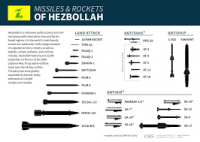-
Israel fighting Iran’s efforts to upgrade Hezbollah’s rockets

Israel has been countering Iranian efforts to use suitcases to smuggle GPS components into Syria to upgrade Hezbollah’s rocket arsenal. In 2017, once it appeared that Syrian dictator Bashar al-Assad would survive the civil war that was tearing his country apart, “Iran embarked on a grandiose plan for increasing its influence in the shattered country,” says an expert. Iran’s goal was to “build a force of up to 100,000 Shiite fighters from Pakistan, Afghanistan and Iraq. They built intelligence bases and an air force base within each Syrian airbase. And they brought civilians in order to indoctrinate them,” said Israel Defense Force’s former chief of staff, Gen. Gadi Eisenkot.
-
-
There is no national emergency on the border, Mr. President
President Trump [last week] declared a national emergency on the border to construct some portion of his promised border fence. “We’re talking about an invasion of our country with drugs, with human traffickers, with all types of criminals and gangs,” President Trump said during his remarks. Lawyers will spill much ink arguing about the legalities surrounding the law and whether President Trump can declare a national emergency. Regardless of what the law ultimately means, no reasonable person can look at the southern border and agree that it rises to the level of a national emergency.
-
-
U.S. Coast Guard officer to be charged with mass terrorism plot
Christopher Paul Hasson, a U.S. Coast Guard officer will appear in court today (Thursday), charged with plotting a massive, 2-prong attack modeled after the 2011 Anders Behring Breivik’s terrorist attack in Norway. Breivik killed eight people in Oslo as a diversion, before killing 69 teenagers in a summer camp organized by the Norwegian Social Democratic Party. Hasson compiled a hit list of liberal politicians, Supreme Court judges, and journalists – but his violent plans extended to trying to “establish a white homeland,” and using biological weapons to “kill almost every last person on Earth.”
-
-
U.S. hate groups hit record number last year amid increased violence
American hate groups had a bumper year in 2018 as a surge in black and white nationalist groups lifted their number to a new record high, the Southern Poverty Law Center said in a report issued Wednesday. The increase was driven by growth in both black and white nationalist groups, the SPLC said. The number of white nationalist groups jumped from 100 to 148, while the number of black nationalist groups — typically anti-Semitic, anti-LGBTQ and anti-white — rose from 233 to 264. Some conservative groups have accused the SPLC of unfairly labeling them as “hate groups,” and last month, the Center for Immigration Studies sued the SPLC for “falsely designating” it as a hate group in 2016, saying the SPLC has produced no evidence that the group maligns immigrants as a class.
-
-
U.S. will not take back Alabama woman who joined Islamic State
The United States claims Hoda Muthana does not have a U.S. passport, and has no right to obtain one. A lawyer for her family argued Muthana does have that right because she was born in New Jersey.
-
-
To be effective, terrorism prevention programs need strengthening
National capabilities for terrorism prevention — which refers to options other than traditional law-enforcement action to respond to the risk of individual radicalization to violence — are relatively limited, with most relying on local or non-government efforts and only a subset receiving federal support, according to a new report. to address the gaps in capability, the most effective path for the federal government would be to strengthen, broaden and sustain this local and non-governmental capacity. But such efforts will be hampered because past counterterrorism and countering-violent-extremism (CVE) efforts have significantly damaged trust in some communities.
-
-
School shooters usually show these signs of distress long before they open fire, our database shows
Our initial analysis of the school shooting data found some noteworthy patterns. All mass school shooters since 1966 had a large number of risk factors for violence. Forty-five percent had witnessed or experienced childhood trauma, 77 percent had mental health concerns, as evidenced in a prior diagnosis, previous counseling or hospitalization, or medication use, and 75 percent had an interest in past shootings, as evidenced in their writing, social media posts or other activities. The majority of mass school shooters – 87 percent – showed signs of a crisis, as exhibited in their behavior, before the shooting. Seventy-eight percent revealed their plans ahead of time, often on social media. As juveniles, they also used guns that they stole from parents, caregivers and other significant adults in their lives. Our analysis found that about 80 percent of mass school shooters were suicidal. These findings make it clearer why current strategies are inadequate.
-
-
Antimicrobial resistance: A neglected biodefense vulnerability

We typically think that biodefense is about defending against bioterrorism or the next pandemic – or, in extreme cases, about some laboratory accident. Biodefense is mostly about all these things, but also about much more. Antimicrobial resistance is not a headline-grabbing topic and it certainly is not getting its own apocalyptic outbreak movie anytime soon, but the microbial threat has been growing since antibiotics were first discovered.
-
-
Hardcore white supremacists elevate Dylann Roof to cult hero status
When Dylann Roof murdered nine people in a racially motivated shooting spree at the Emanuel African Methodist Episcopal Church in Charleston, South Carolina, in 2015, reactions from fellow white supremacists were all over the map. While some praised the shootings, others claimed the attack was fabricated by the government or Jews to cast a bad light on white supremacists. Within the past two years, a number of zealous Roof fans and would-be copycats have emerged, including some who have crossed the line into criminal activity:
-
-
Survey shows that Britain had record number of anti-Semitic incidents in 2018
The year 2018 saw a record number of anti-Semitic incidents in Britain, a fact that comes down to “anti-Semitic” politics, not news about the Israeli-Palestinian conflict, according to a new survey by the Community Security Trust (CST). The number of recorded anti-Semitic events rose 16 percent in the last year to 1,652 incidents around the country.
-
-
Israel’s Ministry of Strategic Affairs: Members of terror groups staff anti-Israel NGOs
An Israeli government report charges that staffers at some of the most prominent organizations and NGOs advocating boycotts of Israel are also members of terrorist groups. The report charged that a number of high-profile staffers at NGOs that promote the Boycott, Divestment, and Sanctions (BDS) campaign are tied to the Popular Front for the Liberation of Palestine (PFLP) and other terror groups.
-
-
Israel starts building new barrier along Gaza Strip border
Israel on Sunday it had started to build a new barrier along the country’s border with the Gaza Strip in order to prevent terrorists from entering Israeli territory. The barrier will be 65 kilometers long and six meters high. The Defense Ministry said that the above-ground barrier would work in conjunction with an underground wall, currently under construction, which aims to neutralize the possibility of cross-border tunnels built by Hamas militants.
-
-
Qatar plays key role for peace in the Horn of Africa
The past year’s unexpected outbreak of peace between former rivals Ethiopia and Eritrea in the Horn of Africa was the result of a decade of patient diplomacy, investment, and military peacekeeping by several regional states, most notably Qatar. The small, oil-rich Emirate in the Persian Gulf has now emerged as a significant regional power.
-
-
Review of the “Digitization of WMD” symposium
The digitization of biological and medical science is providing exciting and promising new pathways for improving health and daily life for mankind and our environment. The possibilities for new treatments, better fitness, and less prevalence of genetic diseases are numerous. However, these technologies and the information associated with emerging techniques carry certain risks and vulnerabilities. It is through understanding these risks and continuing to develop mitigation strategies for them, especially during the technology conceptualization and development phases, that we can continue to build promising new tools to improve life with confidence while addressing how they should be properly used.
-
-
FBI: No discernible motive in Las Vegas mass shooting
The shooter who perpetrated the 2017 Las Vegas massacre – the deadliest in U.S. history — was no different from many other mass shooters, in that he was apparently driven by a complex mix of developmental issues, rather than by one, overriding morive. The FBI’s report, published after a year-long FBI investigation, suggests that Stephen Paddock may have tried to emulate his father’s criminal conduct. His father was a bank robber who was once on the FBI’s most wanted list.
-
More headlines
The long view
What Does Netflix’s Drama “Adolescence” Tell Us About Incels and the Manosphere?
While Netflix’s psychological crime drama ‘Adolescence’ is a work of fiction, its themes offer insight into the very real and troubling rise of the incel and manosphere culture online.
